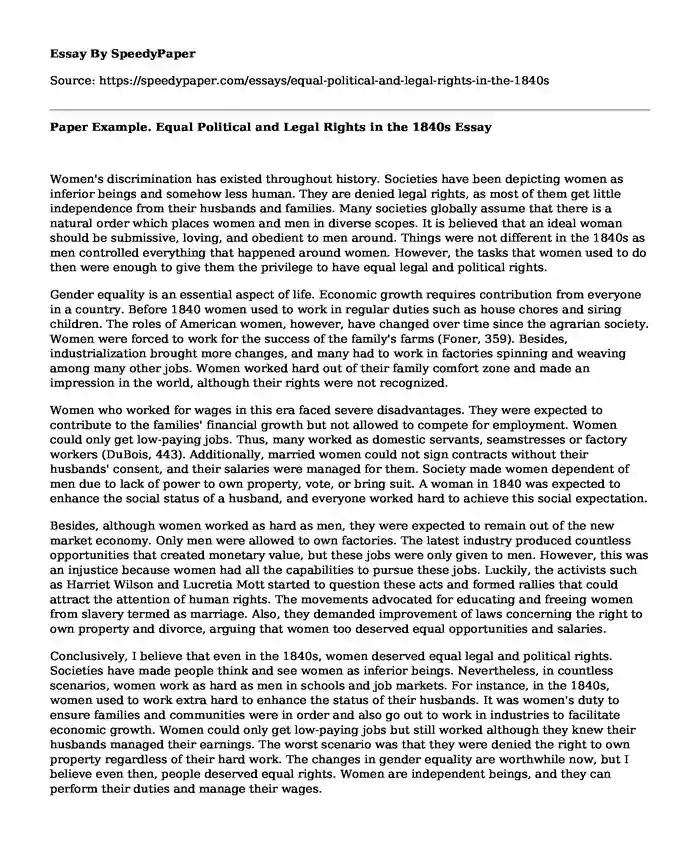
| Type of paper: | Essay |
| Categories: | Women Gender Discrimination Human rights |
| Pages: | 3 |
| Wordcount: | 622 words |
Women's discrimination has existed throughout history. Societies have been depicting women as inferior beings and somehow less human. They are denied legal rights, as most of them get little independence from their husbands and families. Many societies globally assume that there is a natural order which places women and men in diverse scopes. It is believed that an ideal woman should be submissive, loving, and obedient to men around. Things were not different in the 1840s as men controlled everything that happened around women. However, the tasks that women used to do then were enough to give them the privilege to have equal legal and political rights.
Gender equality is an essential aspect of life. Economic growth requires contribution from everyone in a country. Before 1840 women used to work in regular duties such as house chores and siring children. The roles of American women, however, have changed over time since the agrarian society. Women were forced to work for the success of the family's farms (Foner, 359). Besides, industrialization brought more changes, and many had to work in factories spinning and weaving among many other jobs. Women worked hard out of their family comfort zone and made an impression in the world, although their rights were not recognized.
Women who worked for wages in this era faced severe disadvantages. They were expected to contribute to the families' financial growth but not allowed to compete for employment. Women could only get low-paying jobs. Thus, many worked as domestic servants, seamstresses or factory workers (DuBois, 443). Additionally, married women could not sign contracts without their husbands' consent, and their salaries were managed for them. Society made women dependent of men due to lack of power to own property, vote, or bring suit. A woman in 1840 was expected to enhance the social status of a husband, and everyone worked hard to achieve this social expectation.
Besides, although women worked as hard as men, they were expected to remain out of the new market economy. Only men were allowed to own factories. The latest industry produced countless opportunities that created monetary value, but these jobs were only given to men. However, this was an injustice because women had all the capabilities to pursue these jobs. Luckily, the activists such as Harriet Wilson and Lucretia Mott started to question these acts and formed rallies that could attract the attention of human rights. The movements advocated for educating and freeing women from slavery termed as marriage. Also, they demanded improvement of laws concerning the right to own property and divorce, arguing that women too deserved equal opportunities and salaries.
Conclusively, I believe that even in the 1840s, women deserved equal legal and political rights. Societies have made people think and see women as inferior beings. Nevertheless, in countless scenarios, women work as hard as men in schools and job markets. For instance, in the 1840s, women used to work extra hard to enhance the status of their husbands. It was women's duty to ensure families and communities were in order and also go out to work in industries to facilitate economic growth. Women could only get low-paying jobs but still worked although they knew their husbands managed their earnings. The worst scenario was that they were denied the right to own property regardless of their hard work. The changes in gender equality are worthwhile now, but I believe even then, people deserved equal rights. Women are independent beings, and they can perform their duties and manage their wages.
Work's cited
DuBois, E. C. (2018). Women's Rights, Suffrage, and Citizenship, 1789-1920. In The Oxford Handbook of American Women's and Gender History (p. 443). Oxford University Press.
Foner Eric, (July 1, 2017). Give Me Liberty!: An American History (Seagull Fifth Edition) (Vol. One-Volume) Seagull Fifth Edition. Pg. 359
Cite this page
Paper Example. Equal Political and Legal Rights in the 1840s. (2023, Mar 29). Retrieved from https://speedypaper.com/essays/equal-political-and-legal-rights-in-the-1840s
Request Removal
If you are the original author of this essay and no longer wish to have it published on the SpeedyPaper website, please click below to request its removal:
- Free Essay Sample on Organizational Psychology
- Gymnastic Sexual Assault in US, Essay Example for Everyone
- Article Summary Paper Sample: Criminal Justice
- Super Hero Feminism, Free Sample of an Essay
- Essay Example on Handmade Company's Network Management and Security
- Free Essay Example - Head Lice
- Free Paper Example on Ethiopian Globalization
Popular categories




